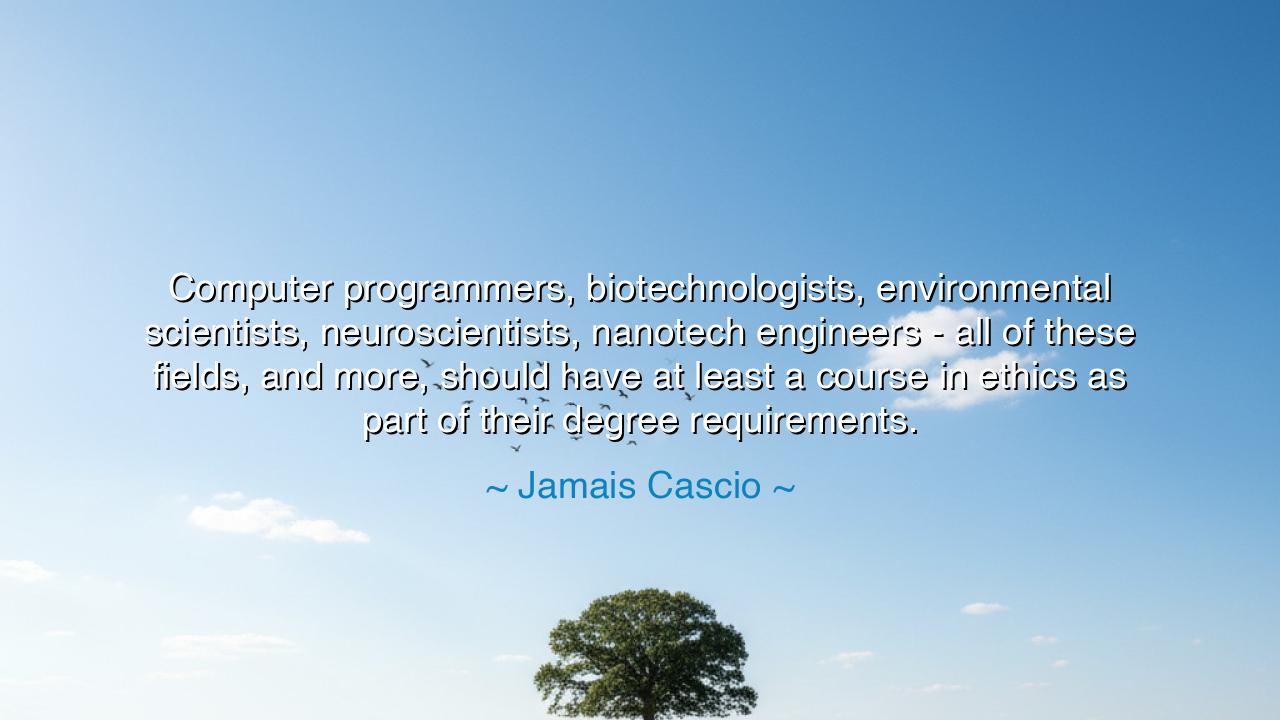
Computer programmers, biotechnologists, environmental scientists
Computer programmers, biotechnologists, environmental scientists, neuroscientists, nanotech engineers - all of these fields, and more, should have at least a course in ethics as part of their degree requirements.






Hear, O seeker of wisdom, the voice of Jamais Cascio, futurist and watchman of humanity’s path, who declared: “Computer programmers, biotechnologists, environmental scientists, neuroscientists, nanotech engineers—all of these fields, and more, should have at least a course in ethics as part of their degree requirements.” This is not the idle suggestion of a scholar, but a trumpet-call, a warning, and a vision. For Cascio understood that knowledge without wisdom is a sword without a sheath, and power without conscience is a fire that consumes its wielder as well as the world.
The meaning of this teaching lies in the recognition that the sciences of today are not like those of old. Once, knowledge of stars, soil, and metals could be held in the palm of a few; their consequences were slow, their reach narrow. But now, with a single algorithm, a single experiment, a single engineered molecule, one mind can alter the lives of millions. Programmers, who build the codes that govern commerce, communication, even warfare, wield immense power. Biotechnologists can shape the very fabric of life. Neuroscientists may unlock the inner workings of thought and desire. Nanotech engineers can build invisible armies of particles to heal—or to harm. In such hands, the absence of ethics is more dangerous than ignorance itself.
History bears witness to this truth. Consider the tale of the Manhattan Project. Brilliant physicists, men of towering intellect, split the atom and built a weapon that shook the earth with fire. They had mastered the science, but not all had mastered the ethics of what they wrought. Some argued it was necessary to end the war; others foresaw only ruin. In Hiroshima and Nagasaki, the consequences of unchecked science revealed themselves in shadows seared into walls, in lives extinguished in an instant. The lesson is eternal: knowledge alone cannot guide us; it must be yoked to conscience.
Nor must we look only to war. Think of the rise of social media platforms in our own time. Crafted by programmers and designers who sought only connection and profit, these tools reshaped politics, culture, and even the human mind. Yet the architects had little grounding in ethics; they did not ask how endless algorithms might erode democracy, amplify hatred, or weaken the bonds of truth. What began as convenience grew into manipulation. Here again we see Cascio’s wisdom: that no field of innovation should advance without the compass of moral reflection.
Mark this well, O listener: Cascio calls not for the end of science, but for its perfection through conscience. A course in ethics is not a chain to bind innovators, but a lantern to guide them. It does not smother the flame of discovery, but ensures that it warms rather than burns, that it heals rather than harms. To train a mind without training the soul is to create not a pioneer, but a potential tyrant, armed with knowledge but blind to justice.
Let this be the lesson: in your own work, whether in science, art, or governance, cultivate conscience alongside skill. Ask not only, “Can this be done?” but also, “Should this be done?” Do not be dazzled by possibility alone, but test it in the fire of wisdom. If you are a student, embrace the study of ethics as essential as mathematics or physics. If you are a teacher, weave moral questions into every lesson. If you are a leader, demand accountability from the innovators who shape the world.
Therefore, O child of tomorrow, carry Cascio’s words as a commandment. Seek knowledge, yes, but seek it as a servant of justice. Learn the codes of machines, the secrets of cells, the mysteries of the mind, but never forget the higher law that binds us one to another: compassion, fairness, and responsibility. For without this anchor, the ship of progress sails swiftly—but toward destruction.
Thus, Jamais Cascio’s words endure as prophecy: every discipline must be tempered with ethics, lest our brightest discoveries become our darkest curses. And when wisdom and knowledge walk hand in hand, then humanity may advance not only in power, but in goodness, building a future worthy of its dreams.






AAdministratorAdministrator
Welcome, honored guests. Please leave a comment, we will respond soon